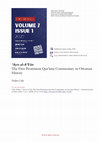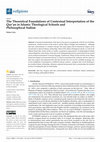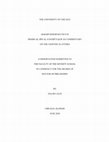Papers by Halim Calis
Religions, Apr 8, 2024
This paper offers a reevaluation of contemporary Western scholarship concerning the historical di... more This paper offers a reevaluation of contemporary Western scholarship concerning the historical discourse on Mary's prophethood within Islamic tradition. Recent research has primarily focused on Andalusian scholars, such as Ibn H . azm and al-Qurt . ubī, and has neglected an essential aspect: the acknowledgement of Mary's prophethood by Ab ū al-H . asan al-Ash'arī, one of the founders of Orthodox Sunni theology. As a result, modern studies have reached conclusions lacking a solid foundation, due to their failure to consider this significant perspective. By incorporating this overlooked perspective, this study seeks to provide a more thorough and coherent understanding of the historical debates surrounding Mary's prophethood.

Australian Journal of Islamic Studies
Muḥammad ibn Ḥamza Shams al-Dīn al-Fanārī (1350-1431) was one of the prominent early Ottoman ... more Muḥammad ibn Ḥamza Shams al-Dīn al-Fanārī (1350-1431) was one of the prominent early Ottoman scholars. After years of education in Anatolia and Egypt, he served as a mudarris and a judge in the Ottoman lands and was consequently promoted to the post of Shaykh al-Islām, the highest office in the Ottoman religious bureaucracy. ‘Ayn al-a‘yān, Fanārī's partial commentary on the opening chapter of the Qur’an, is an outstanding Tafsīr work, in which Fanārī presents his exegetical theory. In his theory, the Qur’anic text is assessed as having multi-layered meanings, including an esoteric sense, and as being open to endless attempts at interpretation. Fanārī connects the multiple layers of Qur’anic meaning with the hierarchical structure of existence theorised in Akbarī metaphysics. Since the text encodes the secrets of existence at the level of esoteric sense, the task of the commentator involves spiritual experience beyond intellectual inquiry. Therefore, in Fanārī’s comm...

Contextual interpretation of the Qur'an has grown in popularity with the rise of Islamic modernis... more Contextual interpretation of the Qur'an has grown in popularity with the rise of Islamic modernism, mostly because of the need to reform Islamic thought and institutions. Although Qur'anic contextualism is a modern concept, this study argues that its theoretical origins can be traced back to classical Islamic scholarship. Most of the Islamic theological schools, as well as the Akbarī School (the school of Ibn al-'Arabī), a prominent representative of philosophical Sufism, acknowledged the contextuality of the Qur'an by distinguishing between transcendent divine speech and its limited manifestation in human language. Furthermore, Shams al-Dīn al-Fanārī of the Akbarī School developed a hermeneutical theory in which he questioned the authority and the nature of Qur'anic exegesis and emphasized the idea that the Qur'anic text can have multiple meanings, due to the multiplicity of perceptions in different human contexts. I propose that, of the thinking in pre-modern Islamic scholarship, Akbarian scriptural hermeneutics best accommodates the modern practice of reading the Qur'an contextually.

Journal of Qur'anic Studies, 2020
‘The Qur'an was sent down in seven readings. Each letter of the Qur'an ha... more ‘The Qur'an was sent down in seven readings. Each letter of the Qur'an has an exterior and an interior. Each letter has a limit and each limit has an observation point’. This statement, attributed to the Prophet Muḥammad, has drawn the attention of both classical and modern scholars. Medieval Muslim scholars presented a variety of understandings regarding this ḥadīth in accordance with their different approaches to Qur'anic exegesis. Ṣūfī commentators on the Qur'an used the ḥadīth to justify their idea that Qur'anic verses had multiple meanings, including levels of esoteric meaning. This study traces selected important interpretations of the ḥadīth proposed by medieval Ṣūfī and non-Ṣūfī Muslim scholars, in order to show how Ṣūfī exegesis of the Qur'an passed through several transformational phases. Whereas the early Ṣūfī commentators differentiated only between literal and esoteric meanings in their interpretive practice, and their understanding of the ḥadīth did not extend beyond the scope of Qur'anic exegesis, later Ṣūfīs, such as the Akbarī School, employed the ḥadīth when building their ontological, exegetical, and even epistemological, theories, and they developed a fourfold exegetical system based on the notions of the ḥadīth. This system reached its climax in Shams al-Dīn al-Fanārī (d. 834/1431), the first Ottoman shaykh al-Islām. In his commentary, he draws parallels among ontological levels of existence, ontological levels of the divine speech, multiple Qur'anic meanings, and a hierarchy of spiritualities. As a result, his exegesis of the Qur'an functions as an epistemological medium that connects spirituality to ontology in his scriptural hermeneutics.
Thesis Chapters by Halim Calis

This dissertation explores the life and works of Muḥammad ibn Ḥamza Shams al-Dīn al-Fanārī (1350-... more This dissertation explores the life and works of Muḥammad ibn Ḥamza Shams al-Dīn al-Fanārī (1350-1431), a notable Ottoman scholar and commentator. Focusing on his Qur'anic commentary ‘Ayn al-a‘yān, the study investigates how Fanārī incorporated Akbarī metaphysical ideas, particularly Ṣadr al-Dīn al-Qūnawī’s, into his exegesis, offering a nuanced approach to Qur'anic interpretation. The dissertation argues that Fanārī emphasized the multilayered meanings of the Qur'an, including its esoteric dimensions, and viewed Qur'anic exegesis as both an intellectual and spiritual pursuit. Through a comprehensive analysis, the study also addresses Fanārī’s contribution to theological debates, particularly on divine speech (kalām), and his position within the larger Akbarī tradition. This work provides an in-depth examination of Fanārī’s hermeneutical methods and his significant role in shaping Islamic thought during the Ottoman period.
KÂFİYECİ’NİN KELÂM İLMİNDEKİ YERİ ve el-ENVÂR fî İLMİ’t-TEVHÎD ADLI ESERİ, 1999
This thesis investigates the life and works of the prominent Turkish scholar Muhammed b. Sulayman... more This thesis investigates the life and works of the prominent Turkish scholar Muhammed b. Sulayman Muhyiddin al-Kāfiyaji, who was born during the reign of Sultan Mehmed I and completed his education in Ottoman lands. The study is divided into two parts: a Turkish section that covers the political, social, economic, religious, and intellectual developments of al-Kāfiyaji's time, and an Arabic section featuring the critical edition of his work Kitāb al-Anwār fī ʿIlm al-Tawḥīd. Through extensive research using biographical, bibliographical, and historical sources, this study presents over eighty works attributed to al-Kāfiyaji and provides a thorough examination of the manuscript copies of Kitāb al-Anwār.
Al-Anwar fi 'Ilm al-Tawhid, 1999
Critical edition of "Al-Anwar" by Muhyi al-Din al-Kafiyaji
Encyclopedia Entries by Halim Calis
Prophethood
The Oxford Encyclopedia of Islam and Women, 2013
Five Pillars of Islam
The Oxford Encyclopedia of Islam and Women, 2013











Uploads
Papers by Halim Calis
Thesis Chapters by Halim Calis
Encyclopedia Entries by Halim Calis